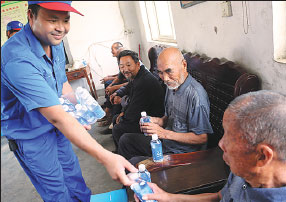Standard Chartered looks to improve eye treatment in China
Fei Yuxi, director of the ophthalmology department at the Guangdong Lianzhou People's Hospital, is looking forward to improving his team's surgical skills and ability to diagnose and treat eye diseases, after they attend a standardized training program to improve eye care in rural China.
Located in Lianzhou, a county-level city with a population of 550,000 in Guangdong province, the hospital he works for has only three ophthalmologists and two of them are fairly young. Last year, they performed more than 600 surgical procedures, including more than 300 cataract operations.
"We need comprehensive training sessions, especially those that improve our surgical expertise," he said.
The program he and his colleagues will attend will offer training sessions on surgery, optometry and the screening of diabetic retinopathy, a leading cause of blindness and a common complication of diabetes.
"Once we have the skills, it will be unnecessary for our patients to travel a long distance to see a doctor at large hospitals in the provincial capital," he said.
Sponsored by Standard Chartered Plc and seven other companies and hospitals, the program is called Standardized Training to Elevate Eye Care in Rural China.
It aims to train 60 hospital executives, 120 ophthalmologists, 60 optometrists and 120 nurses from 60 county hospitals in Shandong, Sichuan, Hebei and Guangdong provinces from January 2016 to December 2019. It also plans to screen 300,000 poverty-stricken patients with eye disease and 300,000 children.
Standard Chartered alone will contribute $1 million. Half of the money to pay for the program has been raised through donations from its employees, clients and partners; the other half comes from the bank.
"A shortage of talent and a lack of expertise at county hospitals are the main bottleneck preventing a tremendous demand for basic eye care from being satisfied in rural China," said John Hong, head of corporate affairs at Standard Chartered Bank (China) Ltd, at a launch ceremony for the program on May 18.
"Our program will focus on strengthening the training of eye care personnel in order to build a talented team for the prevention of blindness at the grassroots level."
China has a severe shortage of optometrists. Currently, just more than 4,000 optometrists have met necessary professional standards. That number should be increased to at least 35,000, said Wang Ningli, vice-president of Beijing Tongren Hospital, a major party running the program.
He said selected teams of eye care professionals from county hospitals will receive training at provincial training centers at designated hospitals. Those who attend the program will have hands-on clinical experience at large provincial hospitals, and the hospitals will help them run their ophthalmology departments smoothly after they return to their own county.
Statistics from the World Health Organization in 2014 showed that 285 million people are estimated to be visually impaired worldwide. Among them, 39 million are blind. But 80 percent of all visual impairment can be prevented or cured.
The economic burden of visual impairment is substantial, according to a WHO regional action plan for the western Pacific (2014-19). In 2000, the global economic loss from visual impairment was $42 billion per year. That figure is expected to rise to $110 billion by 2020.
"Avoidable blindness is a public health issue but it may also become an economic issue if we don't handle it properly," said Standard Chartered's John Hong.
"Through effective intervention, however, we can contribute to sustained community and economic development," Hong said.
In 2003, Standard Chartered launched "Seeing is Believing", a global initiative to tackle avoidable blindness. Originally seeking to raise money for 28,000 cataract operations, the initiative's focus then shifted to providing sustainable and affordable eye care services for people in need.
Until now, the bank has raised $86 million globally, of which nearly 80 million yuan ($12 million) was invested in China to prevent blindness and to help people regain sight, benefiting almost 20 million Chinese.
|
Sinopec employees bring bottled spring water to senior citizens in Jiaxian county, Henan province. Wang Shuangzheng / For China Daily |

























